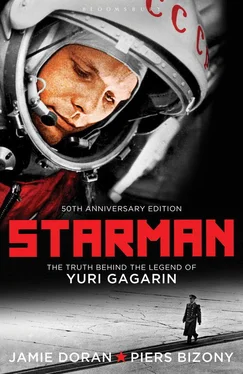Nelyubov’s likeness was airbrushed out of most of the photographs of cosmonaut groups associated with the Vostok programme. In 1973 keen-eyed Western historians discovered a snapshot that had escaped the airbrushing. Star City’s political information officers had accidentally released the photo without realizing its significance – and the ungenerous lies that it exposed. [14] Interview with Oleg Ivanovsky. See also: Hooper, The Soviet Cosmonaut Team , Vol. II, pp. 198–9; Oberg, Uncovering Soviet Disasters , pp. 157–9.
An hour before the launch, Korolev came on the link. ‘Yuri Alexeyevich, how are you hearing me? I need to tell you something.’
‘Receiving you loud and clear.’
‘I just want to remind you that after the one-minute readiness is announced, there’ll be about six minutes before you actually take off, so don’t worry about it.’
‘I read you. I’m absolutely not worried.’
‘There’ll be six minutes for all sorts of things, you know.’ He meant that a minor instrument problem had created a six-minute delay in the launch sequence.
Then cosmonaut Popovich came on the line. ‘Hey, can you guess who’s this talking to you?’
‘Sure, it’s “Lily of the Valley!”’
‘Yuri, are you getting bored in there?’
‘If there was some music, I could stand it a little better.’ [1] Quotes taken from original tapes of ground-to-capsule dialogue, quoted in Golovanov, Our Gagarin , pp. 127–8, 131–42.
Concerned for every last detail of the flight, Korolev took care of this personally, ordering his technicians to find some tapes or records and set something up straight away.
‘Haven’t they given you some music yet?’ he asked a few minutes later.
‘Nothing so far.’
‘Damned musicians. They dither about and the whole thing is sooner said than done.’
‘Oh, now they’ve done it. They’ve put on a love song.’
‘Good choice, I’d say.’
8.41. Gagarin felt the shudder of distant valves slamming shut; the rocket swaying as the fuel lines were pulled away. ‘Yuri, we’re going down to the control bunker now. There’ll be a five-minute pause and then I’ll talk to you again.’
8.51. The music stopped. Korolev’s deep, stern voice on the link, all seriousness now. ‘Yuri, the fifteen-minute mark.’ This was the signal for Gagarin to seal his gloves and swing down the transparent visor on his helmet. In these last minutes before lift-off there was no NASA-style 5–4–3–2–1 ‘countdown’ on the public-address system (and no public-address system). The rocket would be fired at the appointed instant: 9.06 a.m. Moscow Time. Vostok’s guidance expert Yuri Mazzhorin says, ‘The Americans only counted down to add drama for their television.’ Gagarin’s final seconds on the ground were almost anti-climactic.
‘Launch key to “go” position.’
‘Air purging.’
‘Idle run.’
‘Ignition.’
All kinds of vibrations now, high whinings and low rumbles. At some point Gagarin knew he must have lifted off, but the exact moment was elusive, identified with precision only by the electrical relays of the gantry’s hold-down arms as they moved aside, the four sturdy clamps disconnecting from the rocket’s flanks within a single hundredth of a second of each other. Gagarin lay rigid in his seat and tensed his muscles. At any moment something could go wrong with the booster, the hatch above his head might fly away and his ejection charges punch him out into the morning sky like a bullet. This ‘life-saving’ jolt might kill him – crunch his spine; snap his neck like a chicken’s; the hatchway’s rim might snag his knees and tear them right off. He had to be prepared.
The g-load climbing. No emergency ejection yet… He didn’t remember it later, but they told him he shouted out, ‘ Poyekhali! ’ – ‘Let’s go!’ His officially sanctioned account of the lift-off in The Road to the Stars clearly shows his fascination with the launch:
I heard a whistle and an ever-growing din, and felt how the gigantic rocket trembled all over, and slowly, very slowly, began to tear itself off the launching pad. The noise was no louder than one would expect to hear in a jet plane, but it had a great range of musical tones and timbres that no composer could hope to score, and no musical instrument or human voice could ever reproduce. [2] A full account of the flight, including extensive quotes from Gagarin himself, can be found in Belyanov, V., et al. , ‘Tomorrow is Space Programme Day: the Classified Documents on Gagarin’s Spaceflight’, Rabochaya Tribuna , April 11, 1991, pp. 124–8. For an English translation, see Joint Publications Research Service-USP-91–004, September 20, 1991, pp. 71–7. Further details of the flight can be found in ‘Yuri Gagarin’s Immortal Day’, Spaceflight magazine, April 1991, pp. 124–8. See also: Baker, David, The History of Manned Spaceflight , London: New Cavendish, 1981, pp. 70–73; and Burchett & Purdy, Cosmonaut Yuri Gagarin , pp. 110–17 for a highly censored account of the flight.
‘T-plus seventy.’
‘I read you, seventy. I feel excellent. Continuing the flight. G-load increasing. All is well.’
‘T-plus one hundred. How do you feel?’
‘I feel fine. How about you?’
Two minutes into the flight Gagarin was finding it a little hard to speak into his radio microphone. The g-forces were pulling at his face muscles, ‘but really this was not so difficult. The stress was hardly more severe than in a MiG doing a tight turn,’ he recalled afterwards. There was a strange moment when all the weight lifted and he was thrown violently forwards against his straps. A shudder told him that the R-7’s four side-slung boosters were falling away. The ‘Little Seven’ paused in its acceleration, as if taking a big breath before the final spurt. Then the central core picked up the pace and the sensation of great weight returned.
At three minutes, the nose fairing fired its pyrotechnic charges, pulling away to expose the ball. Gagarin caught a glimpse of dark blue, high-altitude sky through his portholes. Now he became slightly annoyed at the brightness of the television lamp, which made him squint if his head was tilted a certain way – when he was trying to look out of a porthole, for example.
Five minutes up. Another jolt as the exhausted central core was dropped. Millions of roubles-worth of complex machinery was tossed aside without a second thought, like a spent match flicked to the ground. Vostok climbed the rest of the way into orbit atop a stunted upper stage, with just one small rocket engine. Nine minutes after he had left the pad, Gagarin was in orbit. The vibrations ceased, yet there was no particular sensation of silence. Only those who have never travelled into orbit are in the habit of describing ‘the eerie silence of outer space’. The ship was noisy with air fans, ventilators, pumps and valves for the life-support system, and yet more fans behind the instrument panels to cool the electrical circuits. Anyway, Gagarin’s ears were covered with microphones hissing with their own special static, or with ground control’s ceaseless demands for news. ‘Weightlessness has begun,’ he reported. ‘It’s not at all unpleasant, and I’m feeling fine.’
Vostok was rotating gently, partly so as not to waste thruster fuel on unnecessary maneouvres, and partly to prevent the sun from heating any surface area of the craft for too long. Through a porthole Gagarin saw a sudden shock of blue, a blue more intense than he had ever seen. The earth passed across one porthole and drifted upwards out of sight, then reappeared in another porthole on the other side of the ball, before drifting downwards out of sight. The sky was intensely black now. Gagarin tried to see the stars, but the television lamp in the cabin was glaring directly into his eyes. Suddenly the sun appeared in one of the portholes, blindingly bright. Then the earth again – the horizon not straight, but curving like a big ball’s, with its layer of atmospheric haze so incredibly thin.
Читать дальше












